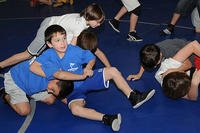While those Soldiers are away it's their children who gain a lesson in resiliency and it's something the Army Family Covenant is making sure they receive.
Dr. Ken Ginsburg literally wrote the book on the subject for the American Academy of Pediatrics and as a practicing adolescent physician of more than 25 years he shared his wisdom with the Fort Sill community.
Ginsburg held an interactive workshop March 23 and 24 at the Resiliency Training Campus. The first day was filled with local educators, trainers and parents while the second day had Reynolds Army Community Hospital's behavioral health community and family advocacy in attendance.
"My basic message is how to support families of those who serve. My area is child and adolescent resilience and getting parents to be able to support their children to make it through all this," said Ginsburg.
He said the bottom line of resilience is that kids need an adult who believes in them unconditionally and holds them to high expectations.
So the challenge for military families is how to make sure that the message is really clear even if someone is very far away.
"If you're talking about men in particular, men show love often by wrestling with a kid or by being present at events like soccer games or recitals. But, the reality is if they're going to be far away they need to be able to express it verbally as well because you can't wrestle a kid or go to a soccer game from a distance," said Ginsburg.
Sandi Vest, Child, Adolescent and Family Behavioral Health Proponency project manager coordinated the event and is also an Army spouse with a teenager. She said she knows how hard it is to for a child to manage a deployment.
"The reintegration is the hardest thing for them. They miss their parent, and they're glad to have them back, but it's a whole new challenge when you have somebody else there telling them what to do, and that person hasn't been there in the last year."
Ginsburg believes all children need resilience to grow up as healthy capable adults, and he said military children are deserving of extra resources because of the extra stressors they are under. While the Army teaches resilience as a mind set, Ginsburg focuses on the support structure for children to ensure they have that right mind set.
"It's easy to make a child happy. To make a four or five year old happy you give them a cookie .You give them a game. What you are really trying to do is produce a happy healthy 35 year old.
That's what you have to remember," said Ginsburg.
He said while that momentary happiness is something all parents want to give their child, sometimes lessons learned in pain will cause them to grow the most.
"We might pick up a child every time they scrape their knee rather than let them learn how to get up themselves.
We might make those mistakes when we're thinking about happiness for the moment."
He said by letting children know that they are loed unconditionally and holding them to high expectations they will rise to the occasion.
While ideally that person would be a parent, it doesn't necessarily have to be. That support could come from teachers, counselors and other members of the community.
"We can't expect children to handle every situation no matter what you give them.
What we learn about kids is that some kids will do really really well in school and are able to handle any stressors there but fall apart at home. Other kids are the opposite," said Ginsburg.
Vest said the Fort Sill community is already ahead of the game in ensuring military children get the support they need, but she wants to see it continue with important lessons like the one Ginsburg offered.
"We're all learning this together, and none of us have the exact right thing to say and do at the time. But, people like Dr. Ginsburg help give us great ideas on what to do for our kids," said Vest.




















